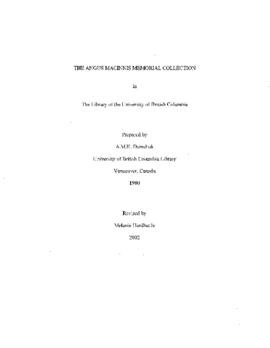Fonds consists of the John Howard Society of British Columbia, Nanaimo Area Council’s records of the Mid-Island Diversion Programme. Founded in 1975, the Mid-Island Diversion Programme formulated its aims and operations upon John Hogarth’s Sentencing as a Human Process (1971) and the Law Reform Commission of Canada’s Working Paper No. 7 on diversion (1975). The programme was founded with the following objectives: providing a community-based diversion program as an alternative to the criminal justice system for individuals who committed minor offenses; shifting the responsibility of addressing such offenses from the government to the community; modifying the attitude of the public towards these offenders and towards the criminal justice system; and working towards the decriminalization of certain minor offenses. The programme was overseen by the Nanaimo Area Council Diversion Programme Support Committee with representatives from the Crown Counsel, RCMP, probation officers, John Howard Society members, and interested community members. Within its first few years, the programme expanded from Nanaimo to also include communities in Cowichan, Duncan, Ladysmith, and Parksville. The programme seems to have continued until around 2019, at which point the John Howard Society, Nanaimo Area Council directed its resources towards other restorative justice efforts.
The programme was designed for adult offenders with no more than two prior convictions who had been accused of the following types of offenses, among others: theft under $200, possession of stolen property under $200, assault, causing a disturbance, possession of marijuana, willful damage, and possession of a prohibited weapon. Adults accused of other types of offenses could be accepted or rejected from the programme based on their previous criminal record, social background, and community presence. Acceptance into the programme required a referral from the Crown Counsel, approval from the RCMP investigating officer and victim, and voluntary participation on the part of the alleged offender. Participation in the programme required the alleged offender’s stated intention to take responsibility for their actions, but did not count as a legal admission of guilt. After acceptance into the programme, the client would formulate a diversion plan with a diversion counsellor. The diversion plan generally required the client to complete the following tasks over a three-month period: community work at a non-profit organization; a letter of appreciation to the RCMP Investigating Officer for referral to the programme; a letter of apology to the victim; if relevant, paid restitution for damages; and meetings with a diversion counsellor weekly or every other week. Upon the programme’s completion, the diversion counsellor submitted a final report to inform the Crown, RCMP, and victim.
Fonds documents the administration and operations of the Mid-Island Diversion Programme, and includes statistical reports, procedural manuals, correspondence, case files, rejection files, and other material.
Fonds is arranged into two series: Administration; and Case files.
John Howard Society of British Columbia. Nanaimo Area Council
